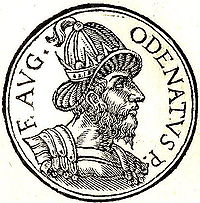- Odaenathus
-
Lucius Septimius Odaenathus, Odenathus or Odenatus (Aramaic: ܐܕܝܢܬ; Oḏainaṯ, Greek: Οδαίναθος; Hodainathos, (Arabic: أذينة; Othayna), the Latinized form of the Syriac Odainath, was a ruler of Palmyra, Syria and later of the short lived Palmyrene Empire, in the second half of the 3rd century, who succeeded in recovering the Roman East from the Persians and restoring it to the Empire.
Life
His full name was Lucius Septimius Odainath.[1] He was of Arameans descent as his name suggests.[2] His gentilicium Septimius shows that his family received the Roman citizenship under an emperor of the Severan dynasty, and thus it was the leading family in Palmyra since the 190s. He was the son of Lucius Septimius Herod (Hairān), the "senator and chief of Tadmor", the son of Vaballathus (Wahballath), the son of Nasor.[3]
The year when Odaenathus became chief of Palmyra is not known, but already in an inscription dated 258 he is styled "the illustrious consul our lord" (N.S.I. No. 126). In his wife, the renowned Zenobia, he found an able supporter of his policy.
The defeat and captivity of the emperor Valerian in 260 left the eastern provinces largely at the mercy of the Persians; the prospect of Persian supremacy was not one which Palmyra or its ruler had any reason to desire. At first, it seems, Odaenathus attempted to propitiate the Persian monarch Shapur I; but when his gifts were contemptuously rejected (Petr. Patricius, 10) he decided to throw in his lot with the cause of Rome. The neutrality which had made Palmyra's fortune was abandoned for an active military policy which, while it added to Odaenathus's fame, in a short time brought his native city to its ruin. He fell upon the victorious Persians returning home after the sack of Antioch, and before they could cross the Euphrates inflicted upon them a considerable defeat.
Then, when two usurping emperors were proclaimed in the East (261), Odaenathus took the side of Gallienus the son and successor of Valerian, attacked and put to death the usurper Quietus at Emesa (modern Homs) and was rewarded for his loyalty by the grant of an exceptional position (262). He may have assumed the title of king before; but he now became totius Orientis imperator, not indeed joint-ruler, nor Augustus, but independent lieutenant of the emperor for the East (Mommsen, Provinces, ii. p. 103).
In a series of rapid and successful campaigns, during which he left Palmyra under the charge of Septimius Worod his deputy (N.S.I. Nos. 127-129), he crossed the Euphrates and relieved Edessa, recovered Nisibis and Carrhae (modern Harran). He even took the offensive against the power of Persia, and twice invaded the Persian capital Ctesiphon itself; probably also he brought back Armenia into the Empire. These successes restored the Roman rule in the East; and Gallienus did not disdain to hold a triumph with the captives and trophies which Odaenathus had won (264). Odaenathus celebrated his victories in the East sharing with his eldest son Hairan (Herodes)[4] the eastern title "king of kings".
While observing all due formalities towards his overlord, there is considerable evidence that Odaenathus aimed at becoming emperor; but during his lifetime there was no conflict with Rome. He was about to start for Cappadocia against the Goths when he was assassinated, together with Hairan, by his nephew Maeonius. There have been suggestions that this deed of violence was instigated by Rome, but there is no evidence in the historical records to corroborate the charge.
According to Imperially biased Historia Augusta, Maeonius killed Odaenathus and his son Hairan during a celebration, because of a conspiracy organized by Zenobia, second wife of Odaenathus, who wanted their son Vaballathus to succeed Odaenathus instead of Hairan (who was the son of Odaenathus by another woman). The more commonly accepted version, according to Gibbon, was that the murder was revenge for a short confinement imposed by Odaenathus to Maeonius for being disrespectful. After his death (266-267), Zenobia succeeded to his position and practically governed Palmyra on behalf of the young Vaballathus.
Notes
- ^ Vogüé, Syrie centrale, Nos. 23, 28; Cooke, North-Semitic Inscriptions. Nos. 126, 530
- ^ Hillers & Cussini, Delbert & Eleonora (2005). A journey to Palmyra: collected essays to remember Delbert R. Hillers. Brill. pp. 195–196. ISBN 9789004124189. http://books.google.com/books?id=oZcr7SzzVYYC&pg=PA195.
- ^ Gawlikowski, Michel, "Les princes de Palmyre", Syria 62 (1985) 251-61.
- ^ According to Gibbon, Herodes was son of Odaenathus, but not of Zenobia.
References
 This article incorporates text from a publication now in the public domain: Chisholm, Hugh, ed (1911). Encyclopædia Britannica (11th ed.). Cambridge University Press.
This article incorporates text from a publication now in the public domain: Chisholm, Hugh, ed (1911). Encyclopædia Britannica (11th ed.). Cambridge University Press.- Long, Jacqueline, "Vaballathus and Zenobia", De Imperatoribus Romanis site
Categories:- 267 deaths
- Syrian people
- Ancient Roman generals
- Crisis of the Third Century
- Ancient Roman murder victims
- Thirty Tyrants
- Palmyra
- Royal Family of Emesa
- 3rd-century monarchs in the Middle East
Wikimedia Foundation. 2010.

